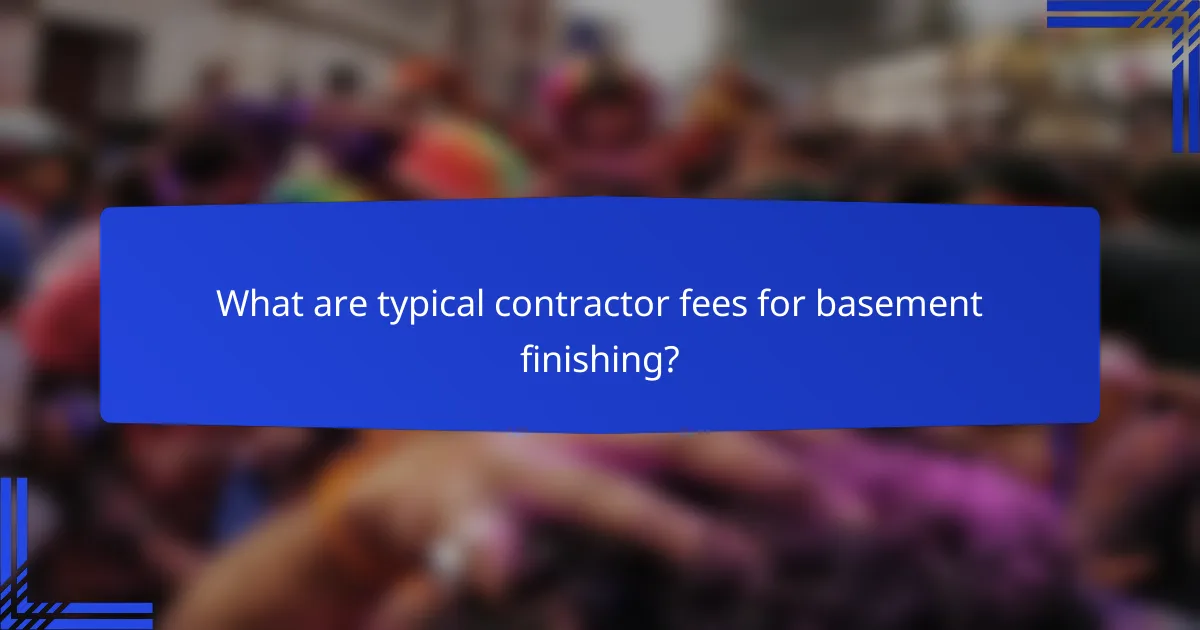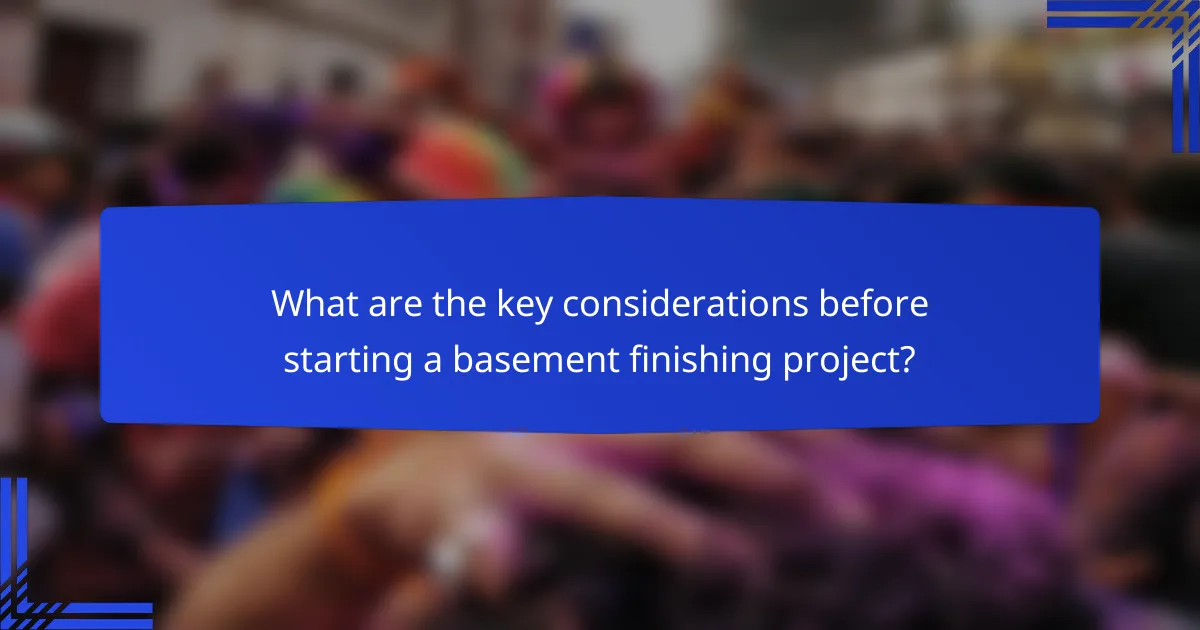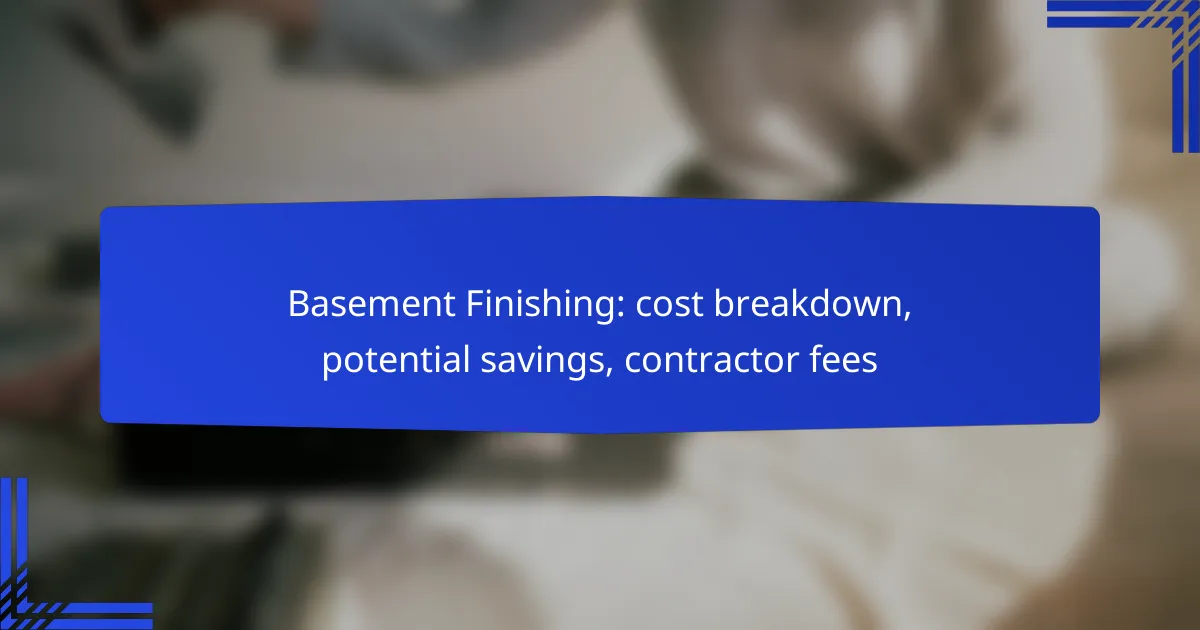Finishing a basement can be a valuable investment for homeowners, with costs typically ranging from £10,000 to £30,000 depending on factors like size and materials. This project not only enhances your home’s value and usability but can also lead to significant savings through increased property value and potential rental income. Understanding contractor fees, which vary based on scope and experience, is essential for effective budgeting in this home improvement endeavor.

What is the average cost of basement finishing in the UK?
The average cost of basement finishing in the UK typically ranges from £10,000 to £30,000, depending on various factors such as size, materials, and complexity. This investment can significantly enhance your home’s value and usability, making it a popular choice among homeowners.
Cost range for basic finishing
For basic basement finishing, costs generally fall between £10,000 and £15,000. This price usually covers essential elements such as drywall installation, flooring, and basic lighting. Homeowners can expect a straightforward layout with minimal custom features.
Basic finishing may include standard materials like laminate flooring and painted drywall, which help keep expenses manageable. It’s a practical option for those looking to create a functional space without extensive upgrades.
Cost range for high-end finishing
High-end basement finishing projects can cost anywhere from £20,000 to £30,000 or more. This range typically includes premium materials, custom designs, and additional features such as wet bars, home theaters, or full bathrooms. The investment reflects the quality and complexity of the work involved.
Homeowners opting for high-end finishes often choose luxury flooring, custom cabinetry, and advanced lighting systems. These upgrades not only enhance aesthetics but also improve the overall functionality of the space.
Factors influencing cost
Several factors influence the cost of basement finishing, including the size of the space, the quality of materials, and the complexity of the design. Larger basements require more materials and labor, which can increase overall expenses.
Additionally, local labor rates and building regulations can affect costs. It’s essential to obtain multiple quotes from contractors and consider their experience and reputation to ensure quality work within your budget.

What are the potential savings from finishing a basement?
Finishing a basement can lead to significant savings by enhancing property value, improving energy efficiency, and creating opportunities for rental income. These benefits can offset the initial investment and contribute to long-term financial gains.
Increased property value
Finishing a basement typically increases the overall value of a home. Homebuyers often view a finished basement as an attractive feature, which can lead to higher offers when selling. Depending on the quality of the finish, homeowners might see a return on investment ranging from 70% to 90% of the renovation costs.
To maximize property value, focus on creating functional spaces such as a family room, home office, or guest suite. Ensure that the work meets local building codes and standards to avoid potential issues during a sale.
Energy efficiency benefits
A finished basement can enhance energy efficiency by improving insulation and reducing heating and cooling costs. Properly insulated walls and ceilings can help maintain a consistent temperature, leading to lower utility bills.
Consider installing energy-efficient windows and doors, as well as using high-quality insulation materials. These upgrades not only save money but can also qualify for local energy efficiency rebates or tax credits, further increasing savings.
Potential rental income
Finishing a basement opens up the possibility of generating rental income, which can significantly offset mortgage payments or other expenses. Many homeowners choose to create a separate living space, such as an apartment or in-law suite, to rent out.
When considering rental options, research local rental rates to determine potential income. Ensure compliance with local zoning laws and regulations regarding rental properties to avoid fines or legal issues. A well-finished basement can command competitive rental prices, providing a steady income stream.

What are typical contractor fees for basement finishing?
Typical contractor fees for basement finishing can vary significantly based on the scope of work, location, and contractor experience. Generally, homeowners can expect to pay either hourly rates or fixed project fees, which can help in budgeting for this home improvement project.
Hourly rates for contractors
Hourly rates for contractors involved in basement finishing usually range from $50 to $150 per hour, depending on their expertise and the complexity of the work. More experienced contractors may charge higher rates, while newer professionals might offer lower fees to attract clients.
When hiring a contractor on an hourly basis, it’s essential to get a clear estimate of the expected hours needed for the project. This helps in avoiding unexpected costs and ensures that the project stays within budget.
Fixed project fees
Fixed project fees for basement finishing can provide more predictable costs, typically ranging from $10,000 to $30,000 for an average-sized basement. These fees often include labor, materials, and sometimes design services.
When considering fixed fees, ensure that the contract outlines all included services and materials to prevent any surprises. It’s advisable to compare multiple quotes to find a fair price for the work required.
Cost variations by region
Contractor fees for basement finishing can vary significantly by region due to differences in labor costs, material prices, and local demand. For instance, metropolitan areas often have higher rates compared to rural locations.
In the United States, homeowners in cities like New York or San Francisco may face costs at the higher end of the spectrum, while those in smaller towns might find more affordable options. Always research local market rates to ensure you’re getting a competitive price for your basement project.

What are the key considerations before starting a basement finishing project?
Before starting a basement finishing project, it’s essential to evaluate your goals, budget, and local regulations. Understanding these factors will help you create a functional space while ensuring compliance with building codes.
Building regulations in the UK
In the UK, basement finishing projects must adhere to specific building regulations that ensure safety and structural integrity. These regulations cover aspects such as fire safety, ventilation, and damp proofing. It’s crucial to consult the local council for the latest requirements applicable to your area.
Common regulations include ensuring adequate escape routes, proper insulation, and compliance with electrical and plumbing standards. Non-compliance can lead to costly modifications or fines, so thorough research is necessary.
Permits and inspections required
Obtaining the necessary permits is a critical step before beginning your basement finishing project. In most cases, you will need to submit plans to your local council for approval. This may involve a building notice or full plans application, depending on the scope of your project.
Inspections are typically required at various stages of the project to ensure compliance with regulations. These may include checks for structural work, electrical installations, and plumbing systems. Scheduling these inspections in advance can help keep your project on track and avoid delays.

How can you choose the right contractor for basement finishing?
Choosing the right contractor for basement finishing involves assessing their experience, checking references, and comparing quotes. A well-selected contractor can ensure quality work while staying within your budget.
Evaluating contractor experience
When evaluating contractor experience, look for professionals who specialize in basement finishing. Ideally, they should have several years of relevant experience and a portfolio showcasing their completed projects.
Consider asking about their familiarity with local building codes and regulations, as this knowledge can prevent costly mistakes. A contractor with a proven track record in your area is often more reliable.
Checking references and reviews
Checking references and online reviews is crucial in selecting a contractor. Request a list of past clients and follow up with them to inquire about their satisfaction with the work performed.
Online platforms can provide insights into a contractor’s reputation. Look for consistent positive feedback and be wary of any red flags, such as unresolved complaints or negative reviews.
Comparing quotes and services
When comparing quotes, ensure that each estimate includes a detailed breakdown of costs and services. This transparency helps you understand what you are paying for and allows for more accurate comparisons.
Be cautious of quotes that seem significantly lower than others, as they may indicate subpar materials or rushed work. Aim for a balance between cost and quality to achieve the best value for your basement finishing project.

What are common design options for finished basements?
Common design options for finished basements include open concept layouts, home office setups, and entertainment spaces. Each option caters to different needs and preferences, allowing homeowners to maximize their basement’s functionality and aesthetic appeal.
Open concept layouts
Open concept layouts in finished basements create a spacious and inviting environment by eliminating walls between different areas. This design is ideal for families who want a versatile space for various activities, such as play, relaxation, and socializing.
When planning an open concept basement, consider the flow of movement and natural light. Use furniture placement to define areas without obstructing sightlines. Budgeting for proper lighting and ventilation is crucial to ensure the space feels welcoming.
Home office setups
Home office setups in finished basements provide a quiet and dedicated workspace away from the main living areas. This option is particularly appealing for remote workers or students who need a focused environment.
To create an effective home office, prioritize good lighting, ergonomic furniture, and adequate storage. Consider soundproofing options if noise from the rest of the house is a concern. Ensure that your setup complies with any local regulations regarding home businesses if applicable.
Entertainment spaces
Entertainment spaces in finished basements are designed for leisure activities, such as watching movies, playing games, or hosting gatherings. This option often includes features like a home theater system, a bar area, or a game room.
When designing an entertainment space, think about the layout and technology needs. Comfortable seating, ample electrical outlets, and good acoustics will enhance the experience. Budget for quality materials and equipment to ensure durability and enjoyment over time.

What are the emerging trends in basement finishing?
Emerging trends in basement finishing focus on maximizing space efficiency and enhancing comfort. Homeowners are increasingly looking for multifunctional areas that serve various purposes, such as home offices, gyms, or entertainment spaces.
Cost breakdown of basement finishing
The cost of finishing a basement can vary significantly based on factors like location, size, and the quality of materials used. On average, homeowners might spend between $20 to $50 per square foot, leading to total costs ranging from a few thousand to tens of thousands of dollars for larger basements.
Key components of the cost include framing, insulation, drywall installation, flooring, and electrical work. Homeowners should also consider permits and inspections, which can add to the overall expense. It’s advisable to obtain multiple quotes from contractors to ensure competitive pricing.
Potential savings on basement finishing
Homeowners can achieve potential savings on basement finishing by opting for DIY projects or choosing cost-effective materials. For example, using laminate flooring instead of hardwood can significantly reduce costs while still providing a stylish look.
Additionally, planning the layout efficiently can minimize wasted space and resources. Consideration of energy-efficient lighting and insulation can lead to long-term savings on utility bills, making the initial investment more worthwhile.
Contractor fees for basement finishing
Contractor fees for basement finishing typically range from 10% to 20% of the total project cost, depending on the complexity of the work and the contractor’s experience. Some contractors may charge a flat fee, while others bill hourly, so it’s important to clarify the pricing structure upfront.
When hiring a contractor, check their credentials and past work to ensure quality. It’s also beneficial to discuss payment schedules and any potential additional costs that may arise during the project to avoid surprises later on.
